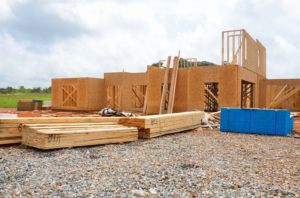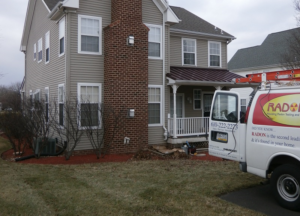Radon Gas – The Silent Killer
Radon Gas is a Leading Cause of Cancer

Radon gas, the silent killer, is a leading cause of cancer. Radon is a radioactive gas that forms from the natural breakdown of uranium, which is commonly found in trace amounts in soil, rock, and water. Radon is the main source of our exposure to all radiation. The Environmental Protection Agency (EPA) has determined that exposure to radon gas is second only to smoking as a leading cause of lung cancer in the United States. In fact, up to 21,000 lung cancer deaths per year have been attributed to the exposure to high levels of radon. Smokers who are exposed to radon are at an even greater risk of developing lung cancer.
Radon gas is called a silent killer because the gas is undetectable to the five senses of sight, sound, smell, taste, and touch. Professionally testing your home to learn if you have unsafe levels of radon gas is the surest way of knowing if you and your family are at risk.
How do You Know if Your Home Has Radon?
Radon gas enters your home or other property from the outdoors, and over time, gradually accumulates to dangerous levels that can result in an increased risk of lung cancer or respiratory issues. Radon gas is dangerous, and if the problem goes untreated, the radon concentration continues to rise inside your home. Over the years, data that tracks radon levels indicates that a large percentage of Pennsylvania homes have a serious radon problem. New Jersey homes and Delaware homes are considered at risk as well because of their proximity to the area. Radon gas testing will help ensure your safety, and the process of radon testing is strongly recommended by The Department of Environmental Protection (DEP) followed by mitigation and remediation if needed.
Do You Have Radon In Your Home? Take Action!
If the level of radon in your home matches or exceeds 4 pCi/L (pico Curies per Liter), the Environmental Protection Agency (EPA) urges home radon mitigation because the average radon concentration level of indoor air is 1.3 pCi/L. The EPA urges homeowners to take action with a professional radon specialist when the radon gas level in the home is between 2pCi/L and 4pCi/L.
Radon gas levels that exceed the average limit are easy and inexpensive problems to solve compared to most home improvement tasks, but taking the action to test your home or building for radon is important. According to Pennsylvania’s Radon Certification Act, only the property owner, the property occupier or a DEP certified radon tester has the authority to test for radon gas.
Using a professional radon testing professional is the surest way to determine whether your home needs remediation. Simple short-term, store-bought radon test kits are convenient, but they can only give you a basic idea of your radon levels. If high radon gas levels are discovered, a long term test can help determine what the average levels are in your home. Long term tests are typically used in the home for 90 days or more.
Can Radon in My Water Harm Me?
If you have high radon levels and you use water from a well, the water should be tested. The main concern is that radon contaminated water will be used for household activities, like showering. When the water steams, the radon gas can be released into the air and breathed in by residents. If you do have radon in your water, you can install a point of entry filter to mitigate the problem.
Many New Homes are Being Built Using Radon-Resistant Materials
 Since exposure to radon is such a health risk, many homebuilders now use radon resistant materials in the construction. These materials can help prevent radon from entering a home. Builders can also install passive systems, with vent pipes that can be used to reduce radon if needed. If you determine that your home’s radon levels are high, these systems are relatively simple for professional radon inspection specialists to convert to active systems by adding vent fans.
Since exposure to radon is such a health risk, many homebuilders now use radon resistant materials in the construction. These materials can help prevent radon from entering a home. Builders can also install passive systems, with vent pipes that can be used to reduce radon if needed. If you determine that your home’s radon levels are high, these systems are relatively simple for professional radon inspection specialists to convert to active systems by adding vent fans.
Awareness of the dangers of radon exposure has risen in the United States. This knowledge has made radon an issue in home buying and selling. As a seller, your home will have a higher value if radon levels have already been mitigated. As a buyer, you will want to know if the home’s radon levels will be a source of expense to you after your home purchase. Many negotiations include testing for radon before the sale is finalized.
Quick Radon Facts
- Regardless of an area’s percentage of homes at risk, your home could be impacted. Even if your neighbor’s home tests low for radon levels, yours may test high, and vice versa.
- Homeowners should avoid performing short term tests when storms are imminent, as the pressure can cause radon gas level spikes and inaccurate readings.
- Most homes’ radon levels can be remediated to remove up to 99% of radon. The right system must be chosen for your home type and soil composition.
- A home can have radon with or without a basement. When testing, the test kit should be placed on the lowest level of the home that is occupied.
Learn More About Your County – Click Here
- Montgomery
- Bucks
- Lebanon
- Berks
- Delaware
- Northampton
- Chester
- Lehigh
- York
- Lancaster
- Philadelphia
The Environmental Protection Agency (EPA) recommends homes be fixed (mitigated) if the radon level is 4 pCi/L (pico Curies per Liter) or more. The average radon concentration in the indoor air of America’s homes is about 1.3 pCi/L. This is the level that the EPA based its estimate of 20,000 radon-related lung cancers per year upon. This average level is also the basis for the EPA recommendation that Americans consider remediating their homes when the radon level is between 2pCi/L and 4pCi/L. The average concentration of radon in outdoor air is .4 pCi/L or 1/10th of the EPA’s 4 pCi/L action level.
Contact Radon-Rid, LLC for Radon Gas Testing and Remediation
Radon-Rid, LLC is a full-service radon testing and remediation company that specializes in radon detection, education and safety. Our goal is to provide quality, first, last and always through education, workmanship and environmental stewardship. Our radon testing and remediation specialists are here to provide you peace of mind and assess the risk of radon in your property.
We Want to Help
"(required)" indicates required fields
Radon – The Silent Killer
Radon In Your Home
- Learn More About Radon Levels in Your County
- Take a few minutes to browse our Get To Know Radon Online Presentation.
- When you are finished, be sure to tell a loved one about our testing programs offered in Berks, Chester, Delaware, Lancaster, Montgomery & Philadelphia Counties.
